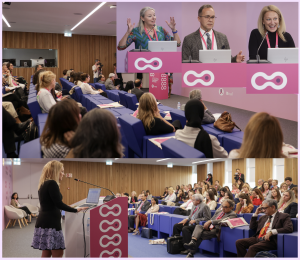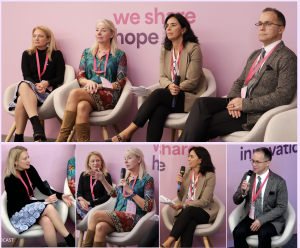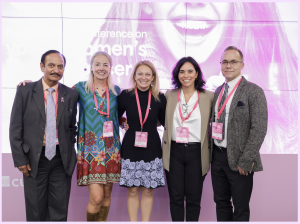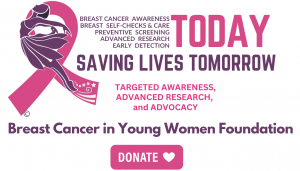
BCYW Foundation Promoting Breast Cancer Care with Genetic Insights, Prevention, Sexual Health Management for Young Women
Advocacy for Genetic Awareness, Cancer Prevention, and Management of Sexual Side Effects in Young Women with Breast Cancer
DENVER, CO, UNITED STATES, December 12, 2024 /EINPresswire.com/ -- The Breast Cancer in Young Women (BCYW) Foundation's session on “Prevention & screening & breast health and breast self-care” highlighted the importance of genetic screening in cancer prevention, polygenic scores in breast cancer screening, and solutions to common challenges faced by young women with breast cancer. The discussion illuminated the necessity for advancing research and care models that ensure not only the survival of young women with breast cancer but also their long-term well-being.Redefining Breast Cancer Prevention
Breast cancer remains one of the leading health challenges worldwide. Advances in genetic testing and personalized screening are now reshaping how the medical community addresses prevention and care. These innovations provide critical insights into genetic predispositions and family history, enabling tailored approaches to risk management. “When you know you have a high risk hanging over you, you want to do something about it,” said Tamara Milagre, a patient advocate who founded an organization supporting individuals with hereditary cancer syndromes. “But you need guidance to decide the best path forward.”
The Role of Genetic Testing in Prevention
Genetic testing has become a cornerstone in identifying hereditary cancer risks. Testing can reveal genetic variants that significantly increase the likelihood of breast, ovarian, prostate, and pancreatic cancers. However, the technology has limitations. “Genetic tests do not capture every possible contributor to cancer,” Ms Milagre cautioned, emphasizing the importance of complementary strategies.
Barriers remain in implementing widespread genetic testing. In Portugal alone, approximately 70,000 new cancer cases are diagnosed annually, with 10% linked to hereditary factors. Yet, many individuals at risk remain undiagnosed due to insufficient genetic literacy among healthcare providers. "Genetic literacy among healthcare professionals is critical to ensure timely diagnosis and prevention," Ms Milagre stressed, highlighting a systemic lack of understanding that delays intervention. For example, one young woman diagnosed with aggressive breast cancer during pregnancy faced dismissive attitudes from her doctor when she reported a lump. "The ignorance she encountered was devastating, and her experience motivated me to act," Ms. Milagre recounted.
“We’re focused on remedies rather than stopping cancer before it starts,” said Ms Milagre, highlighting the lack of emphasis on prevention. Educating healthcare professionals and the public about genetic testing is crucial for early detection and timely intervention.
In many cases, individuals at risk wait for genetic testing or preventive surgeries, only to face delays that result in advanced-stage diagnoses. One heartbreaking story revealed, "They wanted to act, but the system failed them. It was too late—they just got sick." This lack of focus on prevention, combined with limited access to testing, leaves many families vulnerable, perpetuating cycles of illness and grief.
Tailored Screening Protocols
Advancements in stratified management have introduced personalized mammography schedules based on genetic profiles and family history. For example, earlier and more frequent screenings may benefit young women with higher risks. “We’ve adapted screening protocols to help decide when to start mammography and how frequently to conduct screenings,” Dr. Neeme Tõnisson explained.
This approach ensures resources are allocated effectively while reducing the burden on low-risk individuals. Countries like Estonia and Sweden are leading innovative studies on risk-based screening, addressing critical questions such as whether screenings should be annual or dynamically adjusted based on individual factors.
Stories That Inspire Change
Personal stories illuminate the profound impact of hereditary cancer. Ms. Milagre shared her experience of losing both parents, multiple aunts, and a grandmother to cancer. The advocate's genetic testing revealed a high-risk variant, which led to proactive measures and the creation of an organization dedicated to hereditary cancer awareness.
Tragically, many patients face systemic failures. One young woman diagnosed with aggressive breast cancer during pregnancy had her concerns dismissed by a healthcare provider. “The ignorance she encountered was devastating,” Ms. Milagre recounted. “Her experience motivated me to act and advocate for systemic change.”
Innovations and Collaboration
Dr, Tonisson championed technological advancements that offer hope for the future and emphasized that “AI-enabled diagnostic devices are being tested, promising improved accuracy and patient comfort. Large-scale collaborations between academic institutions, healthcare providers, and patient organizations are expanding the scope of genetic sequencing and screening.” “By 2025, we aim to combine genetic and family history insights into unified screening strategies, benefiting thousands of women annually,” said Dr. Tonisson. These efforts highlight the importance of partnerships in advancing prevention and care.
Addressing Survivorship Challenges
Dr. Shari Goldfrab started by saying, “The growing number of survivors of early-stage breast cancer has shifted our attention toward quality of life during treatment and throughout survivorship.” “The majority of women with early-stage breast cancer are alive and disease-free at five years. Survivorship now emphasizes empowerment, quality of life, and proactive care planning—especially for young women in their 20s and 30s;”
“These patients often face challenges related to: Sexual health and identity, Fertility, and Intimacy and relationships. Unfortunately, the efficacy and safety of many sexual health treatments remain under-researched in this population.”
Quality of life for survivors is an equally important focus. Sexual health, often overlooked in breast cancer survivorship, has a profound impact on young women. Many young survivors face challenges related to sexual health, intimacy, and identity, with common concerns including premature menopause, vaginal dryness, and psychological impacts such as depression and anxiety. Efforts to address these challenges through innovative treatments and comprehensive care plans are gaining momentum, emphasizing the importance of holistic care.
“Moving forward, comprehensive strategies that address both physical and psychological symptoms are essential to improving the quality of life for young survivors;” “Larger, multi-center trials are needed to explore more effective interventions and ensure sexual health is integrated into survivorship care plans,” said Dr. Goldfrab while closing her lecture.
Looking Forward
he session underscored the urgent need for systemic change in addressing breast cancer prevention, diagnosis, and survivorship. Stakeholders must collaborate to integrate prevention strategies, enhance genetic literacy, and improve access to cutting-edge technologies. One of the speakers concluded, “This is not just about treatment—it’s about creating a proactive, informed future for families at risk.”
About the BCYW Foundation
The BCYW Foundation is a global organization dedicated to advancing research, raising awareness, and providing support to young women affected by breast cancer. Through partnerships and advocacy, the foundation is committed to creating a future where no young woman feels overlooked in her fight against this disease. The BCYW Foundation relies on individual contributions and sponsors to raise the funds necessary to support its mission. Donate to BCYW Foundation: Every contribution – big or small – helps the BCYW Foundation fulfil its mission to save the lives of young women from breast cancer in the years to come. Thank you for your generosity.
Rakesh Kumar, Ph.D., Founder and CEO
Breast Cancer in Young Women Foundation
bcywf@breastcancerinyoungwomen.org
Visit us on social media:
Facebook
X
LinkedIn
Instagram
YouTube
Distribution channels: Culture, Society & Lifestyle, Healthcare & Pharmaceuticals Industry, International Organizations, Science, Social Media
Legal Disclaimer:
EIN Presswire provides this news content "as is" without warranty of any kind. We do not accept any responsibility or liability for the accuracy, content, images, videos, licenses, completeness, legality, or reliability of the information contained in this article. If you have any complaints or copyright issues related to this article, kindly contact the author above.
Submit your press release



